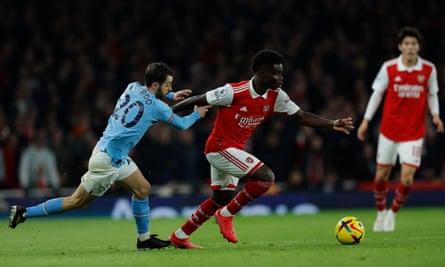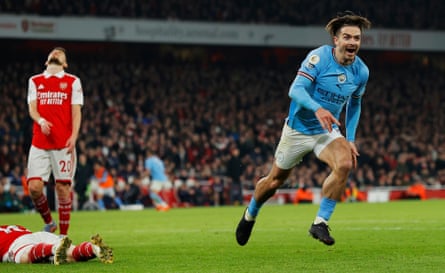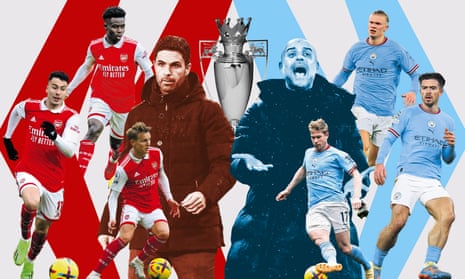It has been a Premier League season of distractions, pop-up windows and one vast and disorientating hiatus. Exactly 34 weeks have passed since Arsenal kicked things off with a Friday night trip to Crystal Palace, a week before temperatures in London hit 34 degrees, four months before Lionel Messi was draped in a propaganda cape in Qatar, a month before Liz Truss was sworn in as temp-to-perm prime minister. Is that story still this story? Is there an actual narrative arc here? Did somebody win the league in between and we’ve all just forgotten and carried on?
The good news, as March folds into April, is that we do now have some clarity. After that hungover summer start; after the fever dream of a northern winter World Cup, an entirely disjointed digression like an hour-long magic realist segue in an annoying arthouse film; after the jet-lagged Christmas restart, and now the weary what-now of a spring international break. After all that, the season is now primed not just for a genuine title race, but for an uncluttered run to the finish.
The set-up is good from here. There are 10 games remaining for the league leaders, 11 for their main pursuers, without breaks or interjections or anything to break the concentration. By happy coincidence this comes as the league still has what is, because of the nature of the participants, a genuine two-way title race.
The next four weeks will bring four key story beats, the same names revolving and colliding through an epic-looking April, the title race equivalent of the hot zone in a game of Pacman, where suddenly the lights flash, the clock starts to tick and it becomes a chase to the death.
This process starts this Saturday, 1 April, with Manchester City at home to Liverpool, a regular source of dropped points and stubbed toes. After which the Super Showdowns and Startling Sundays come thick and fast. Next weekend Arsenal go to Anfield, where they haven’t won in a decade in the league. Wednesday 26 is the pivotal date as City host Arsenal, a chance for either team to inflict a decisive wound, and an occasion that is already flashing and whooshing and zinging with shiny graphics. The following weekend, the last of the month, Arsenal play Chelsea at home, a fixture Arsenal have won four times in their past 14 attempts.

After that both have to play Brighton. Arsenal still have to go to Newcastle and get something. City host Chelsea. But April looks all set to be the coolest month, studded with epic head-to-heads, klaxon-flaring match-ups, five-pundit Sunday lineup energy.
There are a few reasons why this feels noteworthy. First, that prospect of an uninterrupted Premier League run is in itself a break with recent tradition. Lest we forget – actually, please, please do try to forget – the past three seasons have been fogged and muddled by disease and strange scheduling. Look back and this is one of the few unmenaced, fully attended, competitively meaningful two-month stretches the Premier League season has been able to muster up since the world turned strange at the end of the decade.
And second this is, of course, all very good for the product, at a time when the product is, for the first time, facing its own existential threat, the need for a little fluffing and primping of the brand. Club football is the subject of clear tectonic friction right now, forces just off stage keen to reshape how the game works, to create new power bases. There is no bad moment to look vital, competitive, impregnable. But this may be a particularly good one.
Beyond that this is just an excellent, cinematic two-hander. Here we have Arsenal’s peppy new-build team versus the supreme imperial juggernaut of the age, the classic master and pupil dynamic on the touchline, plus the fact Arsenal’s eight-point lead looks either impenetrable or alarmingly fragile depending on how it catches the light.
From here City could end up playing a maximum of 18 games in all competitions, with the three biggest trophies still within their grasp. Arsenal have just those 10 left to play. This seems to suit both teams. City are ice cold in title chases, with the capacity to hit one of those elevated winning streaks where they seem to play with a kind of light around them, where the opposition become simply a piece of staging. More fixtures is probably good.
Arsenal, meanwhile, will be coming at each of these games with a self-contained fury, fuelled by a week of pent-up adrenaline and Mikel Arteta’s bespoke coaching plans. Ten games suits them too.

Certainly the response since losing to City in mid-February has been impressively aggrieved: six straight league wins, three clean sheets, nine different scorers of 19 goals. There have been moments of jeopardy, but also resilience. The system works, energy levels are high, the players simply have to repeat the same movements. There is a chance they could just walk though this thing without looking down, as Leicester did seven years ago.
But Arteta will also be aware that this version of City is getting better, that their stumbles in the first half of the season are no real comfort now. It is an agreeable paradox of the City project that it can secure the best manager, the best hired brains, the best squad, with the absence of fear and risk and destructive profiteering that comes with state ownership, and still remain interesting as a football team.
after newsletter promotion
It looks a fairly simple equation. Talent + money = success. This machine should be unstoppable. What Pep Guardiola has brought is a vital quality of obsessive intellectual interest and of aesthetic beauty. His foibles and perfectionism give this thing a layer of fascination for the neutral.
City’s way of winning has evolved constantly in those seven years, but never more dramatically than this season, when playing with zero centre-forwards has become playing with the most centre-forward centre-forward of all, raw uncut essence of centre-forward, the kind even other centre-forwards look at, turn to their centre-forward friends and say, gee, well there’s a centre-forward. Bob Dylan hasn’t just gone electric here. He’s gone thrash metal.

And while it might be hard to be too blown away by the feat of improving a team by adding a supercharged 22-year-old goal-monster, for Guardiola this has still involved coaching on the hoof, altering the rhythms, and finding ways to bring more out of Erling Haaland while retaining his basic essence.
More touches, more involvement, more goals has been the basic version of the plan. City have won their past six in all competitions with an aggregate score of 23-1. Haaland has nine in his past three games, although he did also miss training this week. Phil Foden is out of Saturday’s game. City still really have only one senior specialist full-back. Does it matter? John Stones has been filling the converted floating right-sided midfield overload merchant to pretty good effect.
Arsenal are also close to full strength. Takehiro Tomiyasu will miss the rest of the season, a blow but not the biggest blow. Gabriel Jesus hasn’t scored for anyone since 1 October last year. But Gabriel Martinelli has found a second bloom in the past few weeks, encouraged to attack more centrally by the use of Leandro Trossard as a mobile false 9.
And probably Arsenal taking the title would be a good thing for the Premier League. City have dominated to the extent their domination starts to become an issue for the product. The way Arsenal win is good. Players have been improved, a system coached, academy players embedded. The stadium has been re-energised, even if some of it looks a bit like people very deliberately “being fans” in a British film from the 90s.
Plus, of course, the Premier League needs that shiver of excitement. Almost all of the PR noise around the Super League project is about competitive balance, about wringing more from this thing. And it is true that functioning domestic title races are rare in Europe’s top leagues. Competitive vigour, fresh characters, new stories. This is all a part of that market-leading supremacy.
A battle has been in train for some time over football’s future, a collision of competing interests, from private profiteering to nation-state propaganda needs. There is even a note of gallows humour in the way the Premier League title race will dramatise this process directly, oil-state soft power versus the standard global capitalist model. April will go a long way toward deciding one element: for City confirmation of an all-time era; for Arsenal’s players a career-defining run to the wire.
